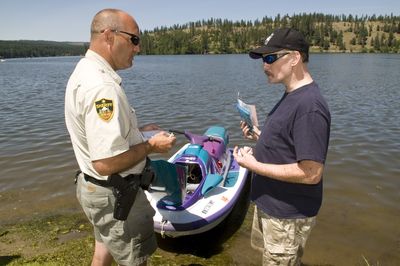Marine deputies target unsafe watercraft use
Recent deaths of two teens highlight dangers of fast, powerful machines

The deaths of two teens on North Idaho lakes in the past month are prompting increased patrols by sheriff’s deputies to stop dangerous personal watercraft practices on Inland Northwest waterways.
Sheriff’s marine deputies said many riders of the watercraft – such as Jet Skis and Sea-Doos – violate boating laws by running too fast or too close to other vessels, docks or shorelines.
Kootenai County this week planned to step up enforcement of personal watercraft rules and to cite violators. Spokane County deputies said they would patrol waterways for violations as well.
Laws in both states require that vessels, including personal watercraft, be slowed to no-wake speed within 100 feet of other vessels.
In addition, both states have daytime speed limits of 50 mph and prohibit operating at above-wake speed near docks and shorelines (within 100 feet in Washington; 200 feet in Idaho). The power and speed of personal watercraft require training and caution, deputies said.
“It’s amazing how fast they are now,” said Spokane marine Deputy Patrick Bloomer. “People are really uneducated about them.”
The most powerful can go from zero to 60 mph in five seconds, he said.
Coeur d’Alene’s Alicia Edgell, 14, died June 13 when she took control of a personal watercraft without the owner’s permission.
Marine Deputy Ryan Higgins, of Kootenai County, said Edgell was told she could not operate the craft and had been riding on the rear of the vessel. When the driver went into the water to cool off, she moved to the driver’s position.
Higgins said the girl was moving at a high rate of speed when she turned the craft abruptly, throwing her from the craft and into another personal watercraft.
Because a craft was nearby, she should have been operating at a no-wake speed, he said.
Idaho and Washington set 14 as the minimum age to operate a personal watercraft, although other states have age limits of 16.
Higgins said he thinks the age limit in Idaho should be 16. Most manufacturers recommend a limit of 16, he said.
In the second fatality, James H. Graham, 18, of Spokane, and his brother, 19-year-old John M. Graham, collided on their personal watercraft June 21 in the Windy Bay area of Hayden Lake.
Deputies said James Graham made a sharp turn just before the collision.
An investigation found that the brothers were operating above wake speed within 100 feet of each other and that speed was a factor in the crash, Higgins said.
The brothers had been avid boaters and were experienced at the controls, Higgins said.
The investigation, which continued last week, was going to be submitted to the Kootenai County prosecutor to determine whether civil or criminal charges apply.
Higgins said negligent boating violations that lead to injury or death could be deemed criminal.
“I think these last two (deaths) could have been prevented,” he said, if safe boating practices had been followed.
Washington last year implemented a boater education requirement for operating any craft with 15 horsepower or greater. This year, boaters age 25 and younger must pass a boater education program, and the age threshold increases to 30 next year and by five years each year through 2014. Free classes are offered in Spokane and Coeur d’Alene. An online program costs $35.
Higgins said he supports implementing boater safety education in Idaho, but a House committee two years ago rejected the idea, which is being advanced by the Idaho Department of Parks and Recreation.
A state parks official said lawmakers told the parks department to talk to boaters to build support for the idea, and that a local county option for boater education is one possibility.
Classes are optional in Kootenai County.
Running a personal watercraft safely is not as simple as it appears, deputies said.
Deputy Bloomer said he believes boating laws are adequate if users would follow them. The problem, he said, is that too many personal watercraft users ignore the laws.
“There is always that contingent that is out there to push the threshold,” he said.